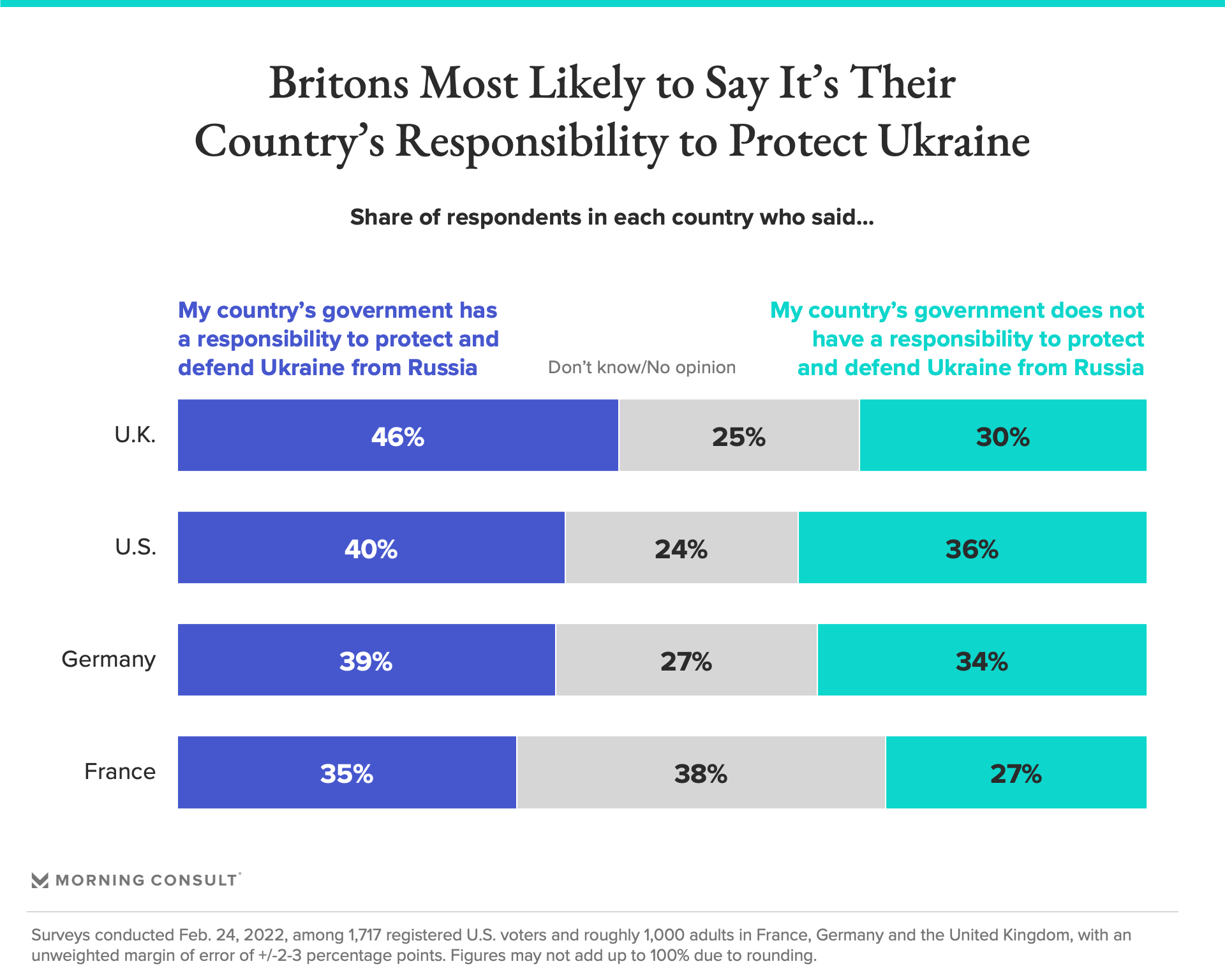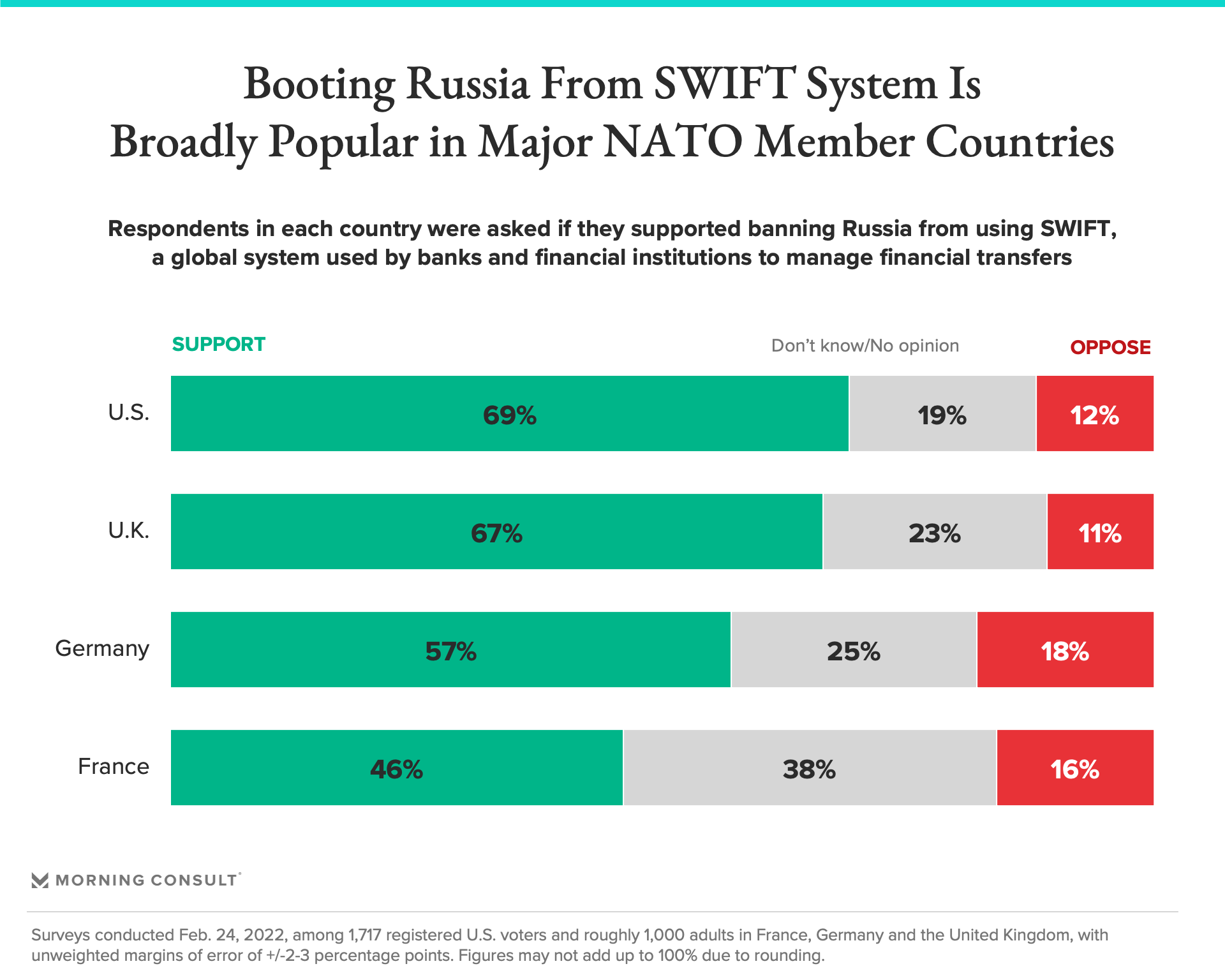British Are Most Eager to Support Ukraine Out of NATO’s Four Biggest Economies
Russia’s invasion of Ukraine represents its latest test of the resolve of the West’s most influential nations, and new surveys show it’s the British who are most likely to say their country has a responsibility to protect Ukraine from President Vladimir Putin. However, large numbers in each of the four major NATO countries still support punishing Russia, including via suspending its access to the international SWIFT banking system.

On the numbers
- Nearly half (46 percent) of British adults surveyed on Feb. 24 said their country's government has a responsibility to protect and defend Ukraine from Russia, compared with 40 percent of U.S. voters, 39 percent of German adults and 35 percent of French adults. Only in the United Kingdom was that sense of responsibility approaching a consensus.
- The British people also overwhelmingly support their government’s sanctions against five Russian banks and three oligarchs close to Russian President Vladimir Putin and cancellation of a visa program for Russian investors: 71 percent back the moves, versus 9 percent who oppose them.
- The British are also more ready to confront Russia with military might than their continental counterparts, with 38 percent in the United Kingdom joining 45 percent of U.S. voters in saying NATO should deploy more troops to eastern Europe even at the risk of direct military conflict with Russia, compared to just 22 percent in both Germany and France.
- Still, Europeans are not turning their backs on Ukrainians fleeing violence: 71 percent in Germany, 69 percent in the United Kingdom and 58 percent in France say their governments have a responsibility to help refugees during humanitarian crises. Respectively, nearly identical shares also back the U.S. deployment of troops to Poland and Romania to assist with evacuations.
The big picture
The West’s response to Russia’s invasion of Ukraine does not yet include one of the most biting provisions brought up over the preceding weeks: the expulsion of Russia from the SWIFT banking system that facilitates global trade and financial flows. Armed with a Kalashnikov carbine, former Ukrainian President Petro Poroshenko on Friday said Russian President Vladimir Putin had “declared a war to the whole world" by invading Ukraine and issued a plea for the West to cut Russia out of the world financial system in response. Clear majorities in the United States, United Kingdom and Germany say they now support such a move, as do nearly half of the French.

However, cutting Russian banks out of the SWIFT system would create obstacles for European creditors hoping to collect on an estimated $30 billion of loans issued in Russia and encourage more nondollar denominated trade, and U.S. President Joe Biden has said NATO member countries in Europe oppose the move for now. Strategic considerations may also be at play, with allies looking to reserve their most powerful sanctions for later.
British Prime Minister Boris Johnson has supported the move, though, and has shown little hesitation in stepping out ahead of the pack by unilaterally slapping sanctions on key figures and institutions in Russia and closing an immigration loophole utilized by wealthy Russians. The British public appears the most ready to take the fight to Russia, with 40 percent favoring dispatching both troops and weapons to Ukraine over just sending weapons or sending no support — the highest among all four countries and nearly double the number in Germany.
What else you need to know
- Germans had previously split over canceling the Nord Stream 2 gas pipeline, and Chancellor Olaf Scholz walked such a fine line on the issue that he would not even say the project’s name at a press conference with Biden this month. However, 54 percent of Germans now support his move to cancel the pipeline, compared to just 37 percent who supported a hypothetical cancellation in the case of a Russian invasion of Ukraine in a Jan. 20-25 survey.
- The prospect of a domestic political backlash associated with the economic costs of the West’s punitive measures is also apparent: Adults in all four countries were slightly more likely to express concern about the rising prices of food, energy and goods than they were to express alarm about Russia’s invasion. However, the bulk of U.S. voters surveyed after the invasion indicated that the pain at the pump or in the shopping aisle is less important than countering Putin with sanctions.
The latest surveys were conducted Feb. 24, 2022, among 1,717 registered voters in the United States and roughly 1,000 adults in France, Germany and the United Kingdom. Responses among U.S. voters have a 2-point margin of error while responses among adults in other countries have a 3-point margin of error.
Matthew Kendrick previously worked at Morning Consult as a data reporter covering geopolitics and foreign affairs.